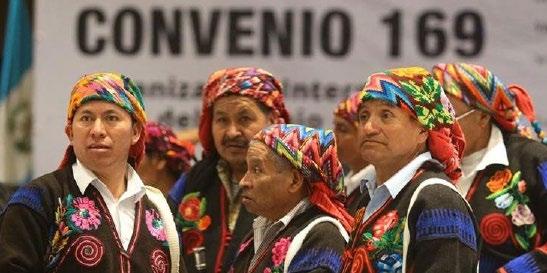
8 minute read
Perspectiva a corto plazo de la Consulta de Buena Fe en Guatemala
Laura Castañeda Gerente Legal Corporativo
Durante los últimos cinco años se ha convertido en un reto hablar sobre la Consulta de Buena Fe, ya que ciertos grupos de interés han conducido la discusión del tema a las vías judiciales, en donde la última palabra la ha tenido la Corte de Constitucionalidad dictaminando la suspensión o cancelación de algunos derechos ya adquiridos por particulares sobre proyectos de inversión relacionados con bienes del estado: agua y subsuelo.
Es importante reflexionar que, aunque el derecho de consulta a pueblos indígenas establecido en el artículo 6 del Convenio 169 de la OIT establece que se someterán a consulta a pueblos indígenas cualquier medida administrativa o legislativa que les afecte directamente, en Guatemala proyectos de inversión pública no han sido judicializados por falta de consulta, solo algunos proyectos de inversión privada en el sector minero y eléctrico.
El Convenio 169 ha sido aprobado por 22 países de los cuales 15 son latinoamericanos , el Convenio “habla español”. Cabe entonces preguntarnos, cuáles son los países latinoamericanos que han logrado mejores prácticas en la aplicación de la consulta de buena fe, y cuáles son los que han logrado desarrollar proyectos de infraestructura, minería y electricidad en zonas indígenas que puedan servir de ejemplo para nuestro país.
La verdad es que formulas exitosas hay varias y sí podemos tener como punto de referencia algunos buenos ejemplos en Latinoamérica. El tema por supuesto no va a escapar de la polémica, por lo que ningún modelo que se pretenda implementar va a ser 100% potable para todos los grupos de interés porque hay algunos que ya tienen una posición radical sobre el tema y no les interesa dialogar sobre posibles fórmulas de aplicación; para estos grupos la consulta, contrario a lo que la misma OIT ha determinado que es un dialogo entre partes interesadas para alcanzar acuerdos, es solo si o no y el cien por ciento de los casos es NO. Colombia, Chile y Perú son países de Latinoamérica que crecen a más del 3.5% anual tiene un buen desempeño en la ejecución de consultas de buena fe para proyectos de desarrollo de infraestructura, minería y electrificación.
Qué enseñanzas podemos tener de ellos para la correcta aplicación de la Consulta de Buena Fe:

Son países con una institucionalidad estatal robusta y con buena reputación gubernamental; Tienen bases de datos sobre grupos étnicos que contemplan cifras precisas sobre: tipos de etnias, ubicación, catastro de tierras, organizaciones representativas, líderes electos por sistemas reconocidos e institucionalidad relevante como interlocutores reconocidos; Han desarrollado normativa interna, ya sea leyes o reglamentos que establecen el o los procedimientos para llevar a cabo Consultas de Buena Fe; Han creado instituciones administrativas responsables de aplicar la normativa de Consultas de Buena Fe; Han destinado recursos económicos en sus presupuestos para cumplir con la obligación estatal de consultar a los pueblos indígenas cuando hayan medidas administrativas o legislativas susceptibles de afectar directamente a los indígenas; Han acompañado muy de cerca procesos de consulta en proyectos en donde el estado no solo es el árbitro, sino también “socio” por virtud del retorno importante en impuestos específicos como las regalías que va a percibir, sin permitir ningún descuido o manipulación de los procesos de consulta para garantizar su cumplimiento y buen destino de los acuerdos logrados; Se han involucrado, en algunos casos desde la figura del presidente, hasta las más altas figuras administrativas del ejecutivo a los primeros procesos de consulta para garantizar su éxito desde la primera vez y Han defendido desde las más altas instancias jurídicas del estado los procesos de consulta DOING BUSINESS & INVESTING IN GUATEMALA
que han cumplido la ley, garantizando así a los pueblos indígenas la salvaguarda de sus derechos y al inversionista la certeza jurídica de la inversión.
En Guatemala con la incorporación al ordenamiento jurídico interno del Convenio 169 de la OIT por medio del Decreto Ley 6-97 ha faltado tan solo un reglamento que estipule cómo se lleva a cabo la consulta previa. Esto lo han querido desconocer insistentemente varios actores políticos, el ultimo desafortunadamente la Corte de Constitucionalidad, contribuyendo con esto que el tema continúe en el limbo jurídico.
Este hecho no ha impedido que muchos proyectos de desarrollo llevados a cabo por industrias relevantes hayan cumplido con el requisito de la consulta de forma voluntaria. Y es que hablar de Consulta Previa a pueblos indígenas es un tema de Sostenibilidad: económica, social y ambiental de De esa cuenta se han desarrollado iniciativas espectaculares con las comunidades de las áreas de influencia de los proyectos, en donde, tal y como es el objetivo del Convenio 169 de la OIT, no solo se han respetado los derechos humanos de los pueblos indígenas sino que se les ha permitido beneficiarse de los acuerdos que han signado entre comunidades, autoridades gubernamentales y desarrolladores privados.
Para salir al encuentro de la Consulta de Buena Fe en Guatemala buenos ejemplos hay, procedimiento también, la Corte de Constitucionalidad ya validó un procedimiento que no fue consultado pero ya fue aplicado, y aunque se puede mejorar ya es funcional; lo ha faltado es la voluntad política para resolver este tema, que seguro si tendrá el gobierno entrante para aplicar la consulta y promover al país como destino de inversión jurídicamente segura.

During the last five years, talking about Good Faith Consultation has become a challenge, because certain interested groups have taken the topic of conversation to judicial means, where the last word is spoken by the Constitutional Court, ruling the suspension or cancellation of certain rights already acquired by individuals on investment projects related to state assets: water and subsoil.
ILO Convention 169 establishes that any administrative or legislative measure that directly affects them will be subject to consultation with indigenous peoples, in Guatemala. Public investment projects have not been judicialized for lack of consultation, only some private investment projects in the mining and electricity sector.
The Convention No. 169 has been approved by 22 countries, of which 15 are Latin American1, the Convention “speaks Spanish”. It’s worth asking, then, which Latin American countries have managed better practices
in the implementation of the good faith consultation, and which have managed to develop infrastructure, mining, and electricity projects in indigenous areas that could serve as an example for our country.
Truth be told, there are plenty of formulas for success, and if we do have some good examples in Latin America as starting points. The topic has not escaped controversy, so no model that is intended to be implemented is going to be 100% viable for all the interested groups, because there are some that already have a radical stance on the topic, and are not interested in discussing possible implementation strategies; for these groups, the consultation is, contrary to what ILO itself has declared as a conversation to reach an agreement between two interested parties, is only yes or no, and in 100% of the cases, it’s No.
Colombia, Chile and Peru are Latin American countries that grow more than a 3.5% annually2, and have a good performance in the implementation of good faith consultations for infrastructure, mining and electrification development projects.
What can we learn from them to put into practice a proper Good Faith Consultation:
These are countries with strong state institutions, and have a good governmental reputation.
They have a database of the ethnic groups that consider accurate figures about: Ethnic categories, location, land registry, representative organizations, elected leaders by recognized systems and relevant institutionality as recognized interlocutors;
They have developed internal regulation, be it laws or regulations that determine the processes to carry out Good Faith Consultations;
They have created administrative institutions responsible for applying the Good Faith Consultations regulation.
They have designated economic resources in their budgets to comply with the State obligation of consulting indigenous peoples when there are administrative or legislative measures that could directly affect indigenous peoples;
They have closely followed the consultation projects where the State is not just a referee, but also a “partner” by virtue of the important tax return, specified as the royalties that they will descry, without allowing any mistake or manipulation of the consultation processes to guarantee its compliance and good destination of the agreements reached;
They have been involved from the first consultation processes, in some cases from the figure of the president, to the highest administrative figures of the executive to ensure its success from the first time and,
They have defended the consultation processes that are in compliance with the law from the highest juridical instances of the state, thus guaranteeing indigenous peoples the safeguard of their rights and the investor and the juridical certainty of the investment.
In Guatemala, with the incorporation of the ILO Convention No. 169 into the domestic legal order through Decree Law 6-97, there has been a lack of regulations stipulating how the prior consultation is to be carried out. This has been insistently ignored by various political parties, the latest one being, unfortunately, the Constitutional Court, contributing to the continuation of the issue in legal limbo.
This fact has not hindered many development projects from being carried out by relevant industries from meeting the consultation requirement on a voluntary basis. Because discussing the Prior Consultation with indigenous peoples is an issue of Sustainability: economically, socially and environmentally for all involved parties.
This is how marvelous initiatives have been developed with the communities of the projects’ areas of interest, where, as it is stated in ILO’s Convention No. 169, not only are the human rights of the indigenous people’s being respected, but they have also been benefited from the agreements assigned among communities, government authorities and private developers.
There are good examples to be followed if we want to meet the Good Faith Consultation in Guatemala. There is also a proceeding, the Constitutional Court has validated a proceeding that was not consulted, but that has already been implemented, and even though it could be improved, it’s functional. There’s been a lack of political will to solve this issue, the next government will surely have to put the consultation into practice and promote the country as a legally secure investment destination.
Fuentes











